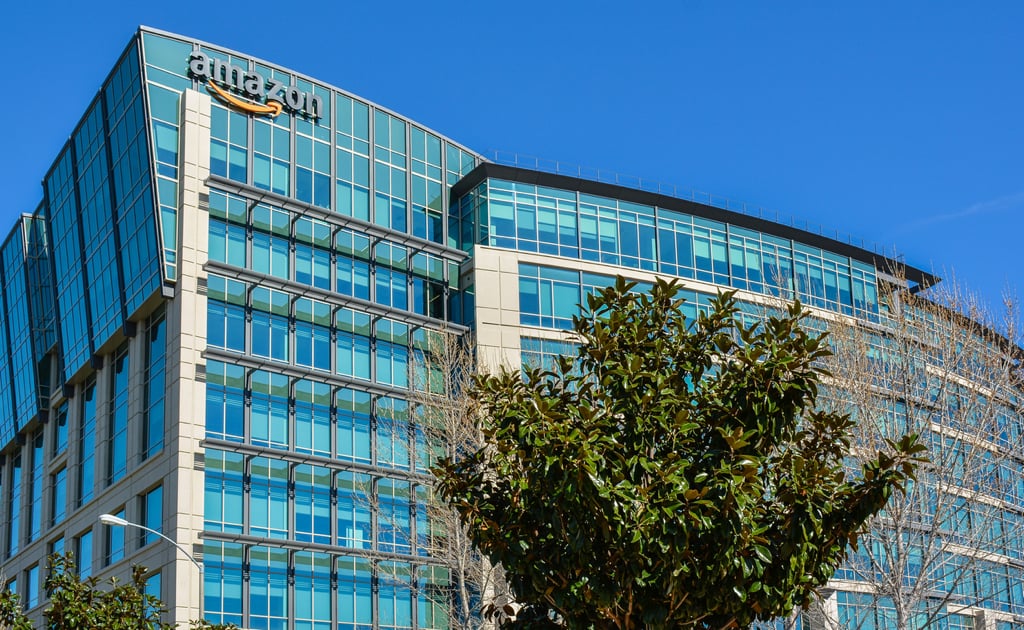Amazon’s plan to build a second headquarters is just about the biggest prize imaginable for development-hungry cities, so it’s not much of a shock that DC paid a marketing firm nearly $140,000 to design and promote its bid for the project, according to documents released Monday. What’s surprising is city officials’ insistence on keeping under wraps the economic incentives it promised the internet commerce giant, should the company decide on Washington.
The documents, which reveal the contract the District offered to a company called Mars on Gravity Productions, were obtained through a Freedom of Information Act request by Kate Rabinowitz, a data journalist who shared them on her Github page.
Municipal officials around North America started whirring September 7 when Amazon announced its intention to build a second office campus on balance with its main campus in Seattle, which sprawls 8 million square feet and features about 50,000 on-site employees. The District hired Mars on Gravity, signing a $99,800 contract in which the firm agreed to develop the city’s bid for what Amazon calls HQ2, plus marketing materials to sell the public on the city government’s aspirations, according to one of the documents Rabinowitz obtained. The website, Alexawhydc.com—an obvious nod to Amazon’s virtual-assistant software—launched a week later, with a video of Mayor Muriel Bowser conversing with her Amazon Echo device about why DC would be an ideal spot for HQ2.
Mars on Gravity billed the city $38,000 for the website, $21,200 for four or five promotional videos, and $20,6000 for a “pre-submission marketing and engagement campaign,” among other expenses. Development of the official proposal itself was quoted at $17,000. The city’s orders in the original contract are straightforward, instructing Mars on Gravity to draft a proposal that promotes DC’s economic vibrancy and quality of living, and a supportive marketing campaign designed to “engage DC residents, the business community, and other targeted audiences” in supporting the city’s pursuit of Amazon. Two videos, posted October 19, attempt to do this. One features interviews with Washingtonians at a street fair who say Amazon should “obviously” set down here; the second includes testimonials talking up the business climate by high-profile individuals like Wizards and Capitals owner Ted Leonsis and former Mayor Anthony Williams.
The initial contract with Mars on Gravity was finalized on September 21, but the bill increased one week later when the District asked the marketing company to add to the proposal material promoting the possibility of Amazon moving to a site on one of the rivers that flows through the city. The government asked that the proposal include a “branding statement in prose, to emphasize the natural river environment, connectivity to other lively areas like the Capitol Riverfront, Buzzard’s [sic] Point, the Wharf, and others,” along with a series of renderings. Mars on Gravity charged the city $33,500 for the added work, including $10,000 on four renderings. The resulting prose about riverfront property and architectural drawings can be seen in the proposal DC submitted to Amazon on October 19.
But absent from all of Mars on Gravity’s work on behalf of DC’s HQ2 bid is any mention of what’s widely considered to be the most crucial element of any proposal: the economic incentives the city is offering Amazon. From the documents Rabinowitz obtained, it appears this is by design. A second modification to the contract—signed October 20, one day after Amazon’s deadline—asks Mars on Gravity to revise the proposal to “remove chapter on incentives” and “remove references to incentives on introductory page.” The District gave its marketing firm the weekend to make the updates, for which Mars on Gravity billed another $3,800.
In its original request for proposals, Amazon wrote that financial incentives offered by whatever municipality it chooses for its second headquarters will be “significant factors in the decision-making process.” The company says it is in the process of reviewing 238 different proposals from the United States, Canada, and Mexico. A shortlist of finalists is expected in early 2018, though the wait for that reveal has left wide-open the space for industry analysts and news organizations to play guessing games about the most viable cities. Washington is frequently mentioned, along with Chicago, Denver, Boston, Atlanta, Toronto, and Raleigh, North Carolina. But those lists tend to be concocted based on market conditions and aesthetic appeal, an inaccurate science when the real competition is considered to be waged in which municipality can be the most generous.
The District is hardly alone in masking what it offered Amazon. Some suitors have been upfront about it, like New Jersey, which openly boasted about the $7 billion incentive package it proposed. But other places have been opaque, a strategy that can lead to a round of civic shame. Chicago’s leaders were embarrassed when the Seattle Times reported that $1.32 billion of the Windy City’s $2.25 billion proposed incentives would have come from a bit of trickery known as a “personal income-tax diversion,” in which Amazon, if it chose Chicago, would recoup the local income taxes paid by the workers it hires there. Other proposed incentive packages tend to be built on land giveaways and tax holidays.
Based on the second modification to Mars on Gravity’s contract, we can presume that, at one point, DC’s proposal to Amazon detailed the incentive package it offered. But that version seems to be off-limits to the public’s view. The marketing firm, which appears to be based in an apartment in Navy Yard, did not return a phone call seeking comment on its work for the city. The electronic version of the District’s HQ2 bid that’s available on the open internet features 72 pages of glowing prose about Washington and many spiffy renderings of how an Amazon campus rising off the Anacostia River might look.
Chanda Washington, a spokeswoman for DC Deputy Mayor for Planning and Economic Development Brian Kenner, whose office manages the Amazon bid, says the revision removing details about incentives helps keep the city competitive.
“The District’s effort to pursue Amazon’s second headquarters created a buzz across the city and country,” Washington says. “We remain proud of our bid, but are also protective of our competitive process in attracting any business to invest in our city. So we produced a public version of our bid that could be shared widely.”



















